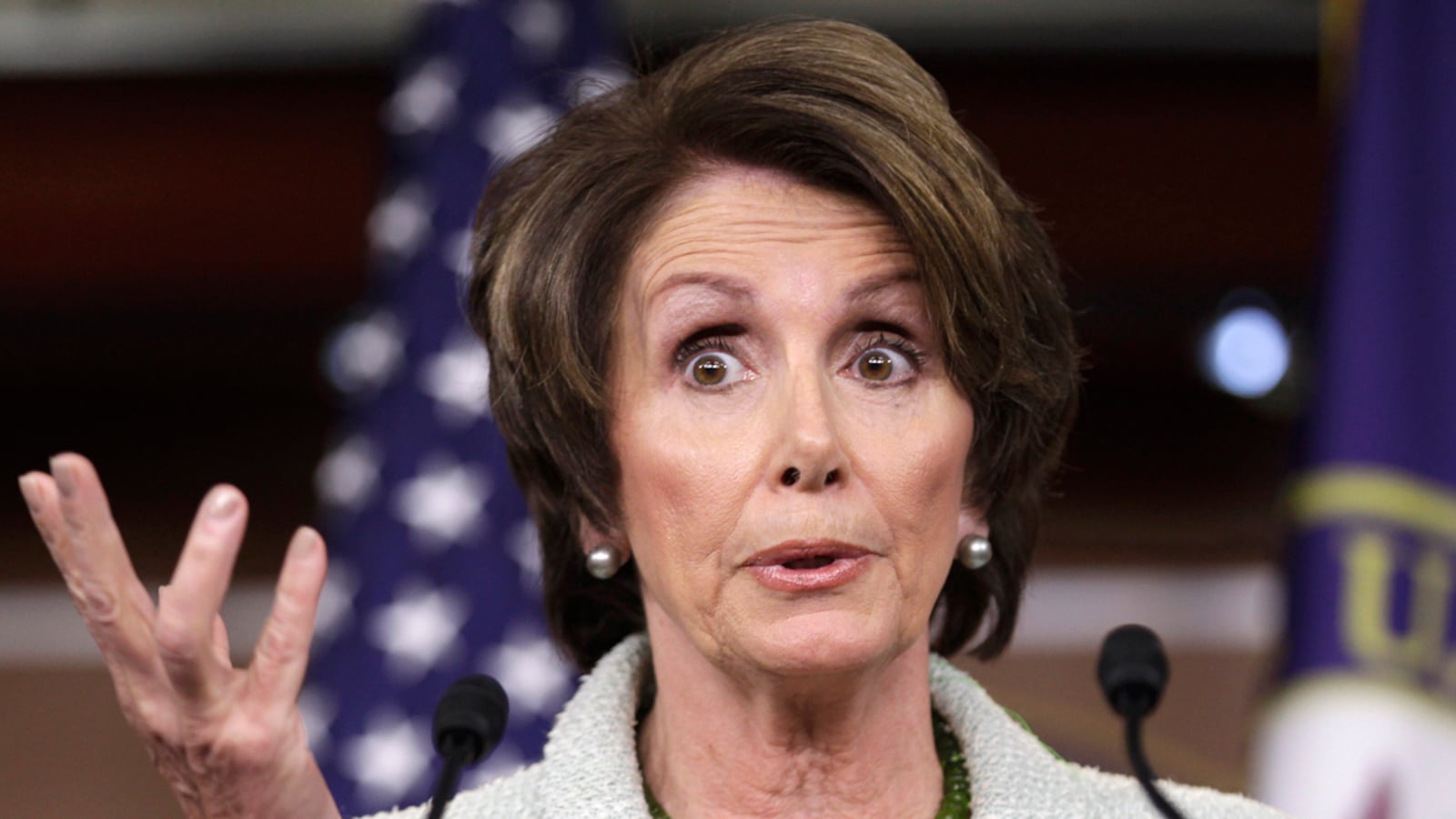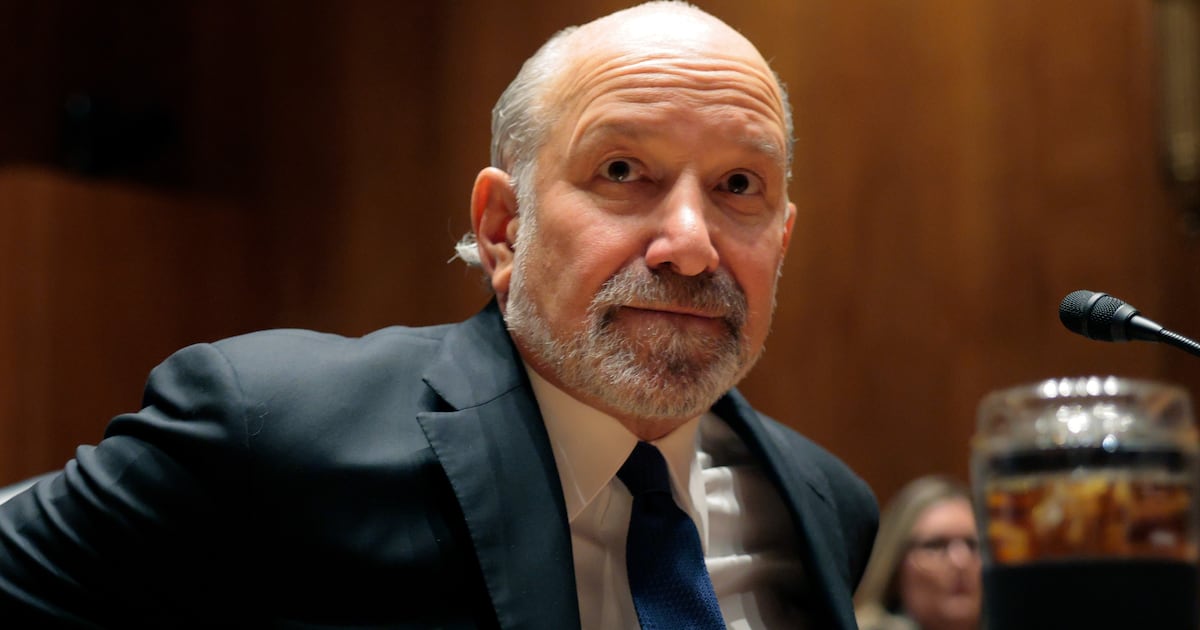Visa has long bragged about its rewards program for consumers. So when its lucrative swipe fees got caught in the congressional crosshairs a few years back, the credit-card giant developed a special program for then–House Speaker Nancy Pelosi to feel its influence.
The lobbying campaign, reconstructed by Newsweek and The Daily Beast through interviews and documents, speaks volumes about the efforts of big business to curry favor, even among perceived enemies. It also shows how such efforts can personally and politically benefit politicians, even ones like Pelosi who set out to suffocate the “culture of corruption” in Washington or ultimately didn’t give Visa what it wanted.
The tale begins in 2007, when the credit-card industry became concerned that the new Democrats who took charge of Congress after the 2006 elections were intent on passing legislation to curtail credit-card swipe fees to vendors, which were worth billions of dollars in revenues in the industry, and to create new protections for consumers.
Visa had never been particularly close to Pelosi, a frequent critic of the financial industry, even though the credit-card giant’s headquarters were in her hometown of San Francisco.
But the army of lobbyists Visa assembled—it had a total of 14 lobbying firms at its disposal—set out to try to woo Pelosi with a strategic campaign, hoping to forestall action on any credit-card legislation until after the 2008 presidential election.
“Was there a concerted effort to press Pelosi? Yes. It was partly that she was speaker. But also that Visa’s based out [in her district], where she’s from. They were under attack. It was the confluence between her position and when she engaged she would be intense,” says a lobbyist directly familiar with the effort who spoke on the condition of anonymity because he wasn’t authorized to talk to the press about internal strategy. “We were sitting around the table and decided we needed a concerted effort related to Pelosi. We needed a full-court press.”
The effort began in earnest in late 2007. Ogilvy, one of Visa's outside lobbying firms, picked off one of Pelosi’s government-affairs advisers, Dean Aguillen, who had close ties in the speaker’s office. Aguillen quit the speaker’s team and went to Ogilvy in December 2007. By law he was unable to lobby his former boss for a year, but he immediately registered to lobby Congress on the credit-card issue, offering guidance to other lobbyists on Visa’s team during strategy sessions, according to a lobbyist present in strategy deliberations.

In an interview, Aguillen told Newsweek he worked for Visa on the credit-card-legislation issue and sporadically talked with his former colleagues in Pelosi’s office. “It’s public record that I advocated on behalf of Visa the past few years,” he said. “I didn’t set up a meeting with the speaker directly, but I’ve definitely done some outreach to the House individually. What we did is help Visa build and maintain strong relationships and a strong reputation.”
Aguillen said he didn’t have any lobbying contact the first year after he left Pelosi’s office, but starting in 2009 he did aim to maintain the relationships, and talked about the various issues he was working on.
Asked whether Visa was using his connections for access, he demurred. “This is my first venture into the private sector. I hope that I had done enough that people would find me to be an asset.”
Visa wanted to meet with Pelosi and her top aides to make the case against the swipe fees. That summer Visa’s outgoing CEO, Carl Pascarella, bumped into Pelosi on the street in the San Francisco neighborhood they share, and she arranged for him to contact her Washington office for a meet-and-greet, according to sources families with the encounter.
Around the same time—on July 21, 2008, to be exact—Pelosi’s reelection campaign received a $1,000 donation from Visa’s political-action committee. Two days later, according to Pelosi’s office, the speaker met Pascarella and the incoming Visa chief executive, Joe Saunders, in her Capitol Hill office. The three exchanged pleasantries and no specific legislation was discussed, according to Pelosi’s office.
Aguillen, for his part, also contributed $1,000 to Pelosi and another $1,000 to the Democratic Congressional Campaign Committee during the first half of 2008.
Separately, Pelosi’s husband, Paul, a major investor in California, got a lucrative phone call from his personal broker—a pre-screen invite in March 2008 to take part in Visa’s $17.9 billion public stock offering, at the time one of the hottest stock offerings in an otherwise soft market. The initial-public-offering price was $44 per share and was limited to institutional investors and a group of specially selected individuals. Almost $18 billion was made available in public stock to preselected investors. Paul Pelosi made the cut.
One of about 40 financial institutions to facilitate the public sale was Wells Fargo Shareholder Services, a bank where Paul Pelosi, a seasoned investor, held an account. Before the IPO, Pelosi's financial adviser at Wells Fargo alerting him that he had been approved to purchase Visa stock and, considering the public buzz around the stock, recommending he buy, according to Pelosi’s office.
Paul Pelosi initially bought 5,000 shares at the $44 initial price. Within a couple of days, the shares' value soared to $64. Paul Pelosi purchased 15,000 more shares over the next three months, at much higher prices. The total quantity was valued as high as $5 million, according to the then-speaker’s financial-disclosure form. In late 2008, when the stock market soured, Pelosi sold 1,000 of the first IPO shares for a meager profit of $2,500 to $5,000, records show. He has kept the other 19,000 shares, which now are valued at $95 each.
Nancy Pelosi’s office denies that the meetings, the lobbying, or her husband’s stock purchase had any influence on her legislative actions. Drew Hammill, a spokesman for the Democratic leader, said Paul Pelosi’s finances are kept distinctly separate from the congresswoman’s legislative work, and she complies with all the legal as well as ethical obligations of her position. He also pointed out that Pelosi has repeatedly advocated for legislation the credit-card industry dislikes.
Several bills affecting credit providers snaked through the House in 2008, including one introduced by Rep. John Conyers (D-Mich.) that would have ended the swipe fees, the small percentage that credit companies like Visa charge with every transaction. Another bill by Rep. Carolyn Maloney (D-N.Y.), affording significant new protection to credit-card holders, passed the House but did not make it through the Senate. Conyers’s legislation passed his House Judiciary Committee with bipartisan support on Oct. 3, 2008, the last day lawmakers were in office before leaving to campaign for the election, but was not brought to the floor, which Pelosi controlled as speaker.
Pelosi’s office says she chose not to bring up the swipe-fee bills in 2008 because she did not believe President George W. Bush would sign them into law.
Pelosi tried for consumer protections in 2008, but the next year she put more muscle behind the Credit Cardholders' Bill of Rights, a bill that gave new protections to consumers and was opposed by the credit-card industry. The bill was entirely devoted to preventing consumer exploitation, so swipe fees were not included.
Only after Senate Democratic Whip Dick Durbin of Illinois caught momentum with a bill that would crack down on credit-card companies’ fees in 2009 did the provision eventually make it into law as part of the Dodd-Frank Wall Street Reform and Consumer Protection Act.
When confronted earlier this month at a press conference about the delay in swipe fees, Pelosi said the House waited to act on the swipe fees until “we had a president that could sign the bill.” Her spokesman Hammill says it is preposterous to think Visa’s lobbying or the stock purchases had any influence on the speaker’s legislative actions.







